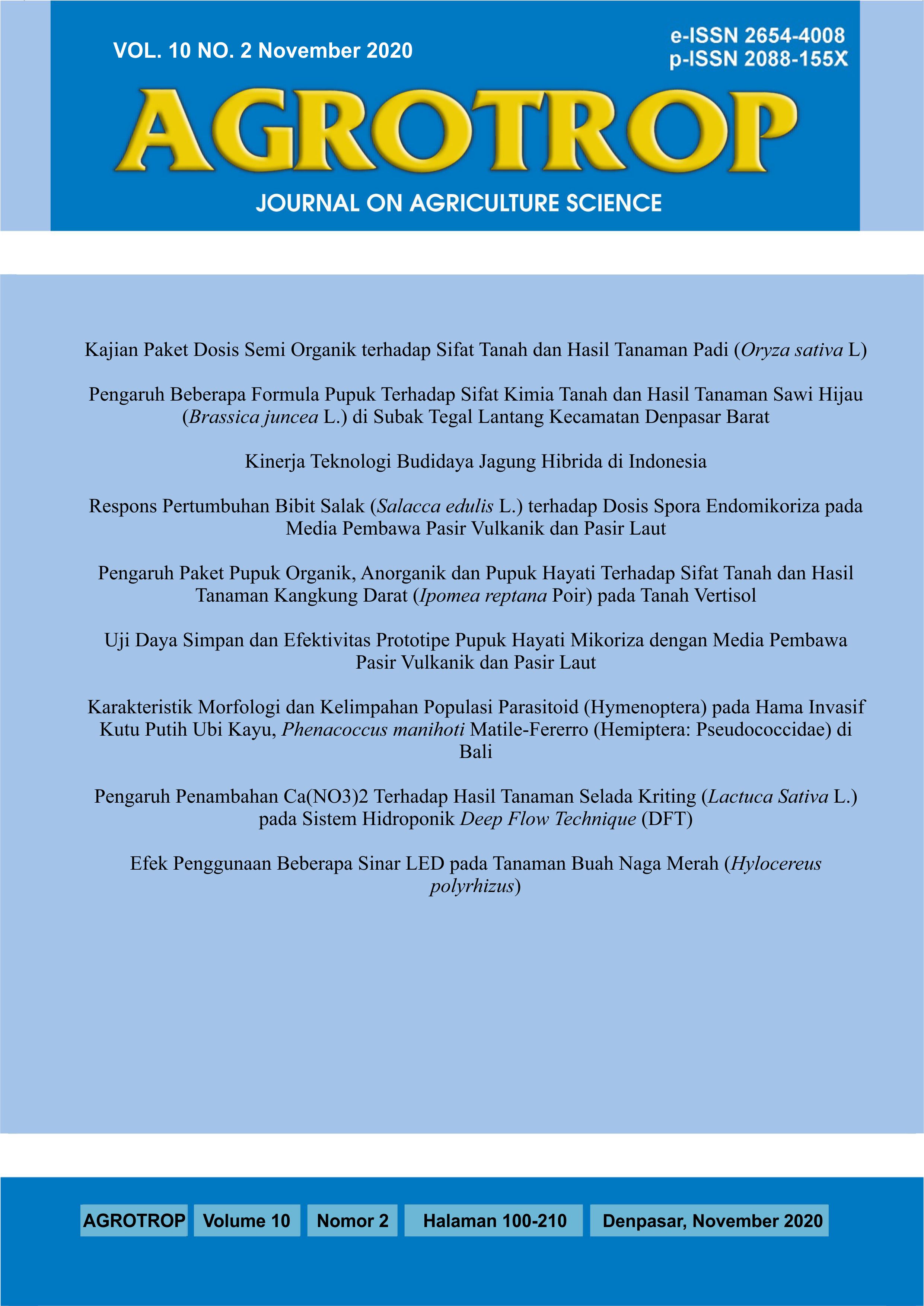Pengaruh Beberapa Formula Pupuk Terhadap Sifat Kimia Tanah dan Hasil Tanaman Sawi Hijau (Brassica juncea L.) di Subak Tegal Lantang Kecamatan Denpasar Barat
Abstract
Effect of Some Fertilizer Formulas on Soil Chemical Properties and Yield of Green Mustard (Brassica juncea L.) in Subak Tegal Lantang, West Denpasar District. The aims of this study is to determine the effect of several fertilizer formulas on soil chemical properties and yield of green mustard (Brassica juncea L.) in Subak Tegal Lantang, West Denpasar District. This study used a Randomized Block Design (RBD) consisting of 6 treatments including controls and repeated 4 times with a total of 24 treatment plots. Fertilization treatment consists of three types of fertilizers, namely organic fertilizer, inorganic fertilizer, and biofertilizer. The fertilizer formula tested consisted of P0 = control (without fertilizer), P1= 5 tons of compost ha-1 + 300kg Phonska ha-1 + 200kg Urea ha-1, P2= 5 tons of compost ha-1 + 300kg Phonska ha-1 + 200kg Urea ha-1 + biofertilizer (1 cc / liter water / plot), P3= 10 tons of compost ha-1 + 300kg Phonska ha-1 + 200kg Urea ha-1, P4= 10 tons of compost ha-1 + 300kg Phonska ha-1 + 200kg Urea ha-1 + biofertilizer (1 cc / liter of water / plot), P5= biofertilizer with a concentration of 1 cc / liter of water / plot. The data from the observed parameters then analyzed statistically using analysis of variance (Anova) to determine the significance of the treatment. If it has a significant effect on the parameters observed, then it will be followed by the LSD test at the 5% real level. The results of study showed that the fertilizer formula treatment had a very significant effect on organic-C (P <0,01) and significantly affected the plant fresh weight (P <0,05), but had no significant effect on the acidity (pH), total-N, available-K, available-P, cation exchange capacity, base saturation, plant height, number of leaves, and plant dry weight. The P4 fertilizer formula gave the highest increase in soil organic-C content significantly by 2.99% or an increase of 66% compared to the control and gave the highest yield of fresh greens mustard by 23.64 tons ha-1.
Downloads
References
Madjid, A. (2017). Kemasaman Tanah. http://distan.buleleng.go.id. Diakses pada tanggal 7 Mei 2019.
Martoyo, K. (2001). Sifat Fisik Tanah Ultisol Pada Penyebaran Akar Tanaman Kelapa Sawit.Warta.PPKS
Rosmarkam, A dan H. W. Yuwono., (2002). Ilmu Kesuburan Tanah. Kanisius. Jakarta.
Setiawati, M. R. (2014). Peningkatan Kandungan N dan P Tanah serta Hasil Padi Sawah Akibat Aplikasi Azolla Pinnata dan Pupuk Hayati Azotobacter Chroococcum dan Pseudo-monas cepaceae. Agrologia, 3 (1): 61-74. Issn. 2301-7287
Setyorini, D., L.R. Widowati, and W. Hartatik. (2000). Organic Fertilizer Characteristic by Composting Technique for Organic Farming Cultivation. InProceeding IX HITI (Soil Science Society of Indonesia), Yogyakarta.
Adiningsih, S. J. (1992). Peranan Efisiensi Penggunaan Pupuk Untuk Melestarikan Swasem-bada Pangan. Orasi Pengu-kuhan Ahli Peneliti Utama. Badan Litbang Pertanian, Deptan.
Setiawan, A. I. (2000). Memanfaatkan Kotoran Ternak. Penebar Swadaya. Jakarta.
Statistik Tanaman Pangan Kota Denpasar. (2015). https://Den-pasarkota.bps.go.id/publication/2016/09/26/345346d3a9b9cea0219ab2fe/statistik-tanam-anpa-ngan-kota-denpasar-2015.html (Diakses 5 April 2020).
Subagyo. (2007). Sawi, Nitrogen, Pupuk. Skripsi Fakultas Per-tanian Universitas Brawijaya Malang.
Syukur, A. dan N. M. Indah. (2006). Kajian Pengaruh Pemberian Pupuk Organik Terhadap Pertumbuhan dan Hasil Tanaman Jahe di Inceptisol, Karanganyar. J. Ilmu Tanah dan Lingkungan Vol. 6 No. 2.











